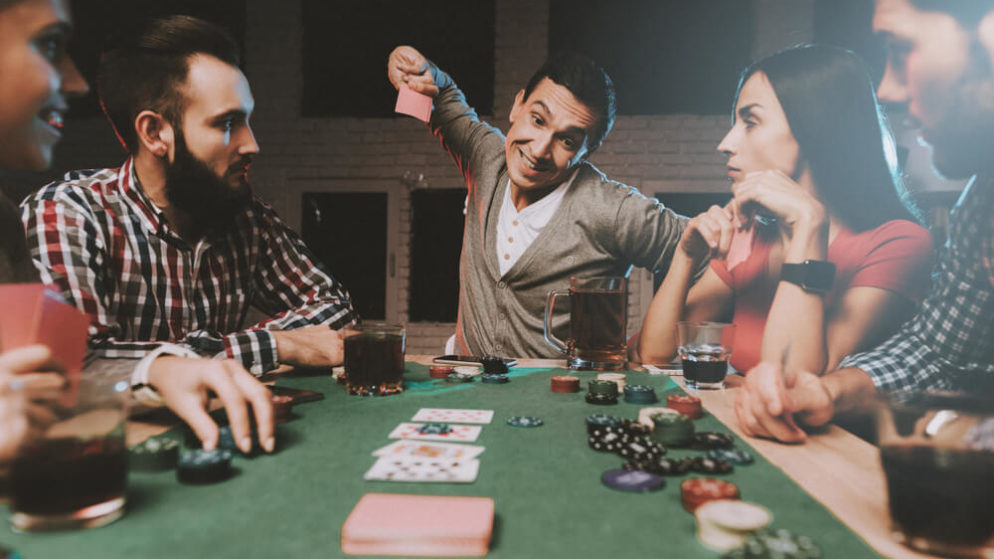

Acceptance of gambling disorder in DSM 5 as a behavioral addiction is a big deal for healthcare practitioners and compulsive gamblers alike in New Jersey. The DSM 5 (the 5th edition of the Diagnostic and Statistical Manual of Mental Disorders) is the current official handbook that’s readily used in the US to diagnose a variety of other mental health disorders for both children and adults. More than that, it’s highly regarded by psychiatrists and clinicians in the US and across the world.
In DSM-5, gambling disorder or compulsive gambling is now covered as one of the several behavioral addictions. This marks the first time the disorder has been formally recognized as a behavioral addiction in the psychotherapy field. The fourth edition of the handbook (DSM-4) didn’t see it as an addictive disorder, but rather an impulse control process disorder. In other words, compulsive gambling was previously referred to as “pathological gambling”.
Even though it has always been a source of controversy, mental health experts have for long sought to establish that there’s a resemblance between drug addiction and gambling addiction. So, in this article, we are going to explain how gambling disorder is defined by DSM-5.
What we cover
Gambling Disorder DSM 5 Definition
The current gambling disorder DSM 5 definition takes flight from the previous description in which compulsive gambling was seen as an impulse control disorder. According to the fifth edition of the Diagnostic and Statistical Manual of Mental Disorders, Fifth Edition (DSM-5), it’s defined as a recurrent and persistent compulsive gambling behavior that leads to significant clinical distress and impairment.
A gambling disorder is diagnosed by following a set of behavioral criteria for at least one year (or 12 months). If the person exhibits at least 4 of the behavioral patterns, then they are clinically diagnosed with a gambling disorder.
Gambling addiction affects around 10 million Americans or roughly 2% of the US population, according to recent statistics by the National Council on Problem Gambling. The condition is usually characterized by an uncontrollable desire to place bets or play casino games even when the consequences are dire, obvious, and damaging.
The frequency and specific type of gambling behavior and disorder can vary from one gambler to the next. However, the person is generally unable to regulate or control their gambling activities. A person with a gambling disorder will continue to bet even in the face of adverse legal, financial, or social consequences.
Research has shown that the majority of gamblers with gambling disorders are usually male, but it can also affect women. In one study carried out in Sweden, researchers found that women are more susceptible to gambling addictions than their male counterparts. However, women are likely to admit the addiction and follow through to recovery.
As with people with other behavioral addictions, disorder gamblers typically use all sorts of ways to cover their tracks and the extent of the addiction. With the emergence of high-quality, easily-accessible NJ online casinos, poker sites, and sportsbooks, it’s easier than ever for problem gamblers to hide their addiction. They can conceal their compulsive gambling activities for months, if not years before the side effects become too obvious to hide.
Gambling Disorder DSM 5 Diagnostic Criteria: The Symptoms
To meet the gambling disorder DSM 5 diagnostic criteria, the gambler must exhibit four or more of the problems detailed below within a period of at least 12 months. On top of that, the person must also display a “recurrent and persistently problematic gambling behavior” that may lead to significant clinical distress, anxiety, or impairment.
Here are the problems for gambling disorder DSM 5 diagnostic criteria:
- The person feels irritable, distressed, or restless when they try to stop or reduce gambling. The gambler may start yelling at people or experiencing angry outbursts at those around them. In reality, this behavior may be manifested in the form of family or gender-based violence, with the kids usually bearing the biggest brunt of irritability.
- Failure to stop or reduce gambling despite trying. The person may have tried to quit gambling several times but they often relapse and the behavior becomes more and more damaging for their health, relationships, and financial situation.
- The person needs to bet with larger amounts of money to achieve the same level of excitement or thrill from betting as before. For instance, someone who used to pay $1.5-per-spin on slot machines must now resort to betting $20 on every spin. This is usually witnessed in people who prefer to play table games, slot machines, poker, and sports betting. That need to gamble with more to get the same experience is a classic symptom of behavioral mental health disorders, often prevented by alcohol abusers or drug addicts.
- The gambler lies frequently to hide their gambling losses. If you often lie, delude, or sensationalize your winnings in order to cover up how much you have lost to gambling, then you may be suffering from compulsive gambling disorder.
- The person can’t seem to stop thinking about gambling. For instance, the person may relieve past betting wins and often plan for upcoming gambling events. This obsessive behavior over gambling is a sign of a deeply-rooted mental health disorder.
- Gambling to mask or evade life’s stressors, such as anxiety, guilt, shame, depression, and so on. If you usually gamble when feeling anxious, guilty, shameful, or depressed, you may have a gambling disorder.
- Chasing losses – Most people with compulsive gambling or other gambling disorders often bet more and more in a bid to try to win back their gambling losses. It’s often tied to the belief that a big win is just around the corner.
- Experiencing losses beyond money. Disordered gamblers often lose lots of money, with some running through their checking and savings accounts, while others rack up credit card debt or deplete their lines of credit. But it doesn’t stop there; they may end up losing their jobs, relationships, friendships, or big career opportunities because of excessive gambling.
- Depending on others to bail you out of financial trouble. Most people with gambling disorders become dependent on others to give them funds to address financial issues that arise from compulsive or reckless gambling.
According to these gambling disorder DSM 5 diagnostic criteria, someone with an episodic gambling addiction may exhibit at least one of the aforementioned behavioral problems. The symptoms usually subside between periods of addiction for several months. This often covers people who often think they don’t have a gambling problem.
Someone with a persistent gambling disorder usually displays their symptoms continuously for multiple years. If you have not shown any of the symptoms for between three and 12 months, however, you may be in early remission. You must follow through and stay the course until you finish the recovery process.
If you have not displayed any of the above symptoms for more than 12 months, then you’re technically recovered from the disorder. This is called sustained remission as per gambling disorder DSM 5 diagnostic criteria. However, as with most forms of behavioral addictions, gambling disorders can also vary in severity.
If you meet 4 to 5 problems in the DSM 5 diagnostic criteria for gambling disorder, then you have a mild case. Those who have shown 6-7 and 8-9 symptoms in the past 12 months or more are said to have a moderate and severe disorder respectively.
Telling the Difference between Bipolar Disorder and Gambling Disorder, according to DMS 5
Today, there’s no question that gambling behaviors can have far-reaching consequences. They can result in emotional, social, and financial problems, but these problematic gambling behaviors can be treated in the same way other addictions are treated.
That’s to say, a gambling disorder like compulsive gambling is treatable using similar therapeutic, medicinal, or psychological treatments for alcohol abuse or drug addiction. This apparent relationship between substance abuse addictions and gambling disorder has been proved multiple times through scientific studies, which is why gambling addiction is now regarded as an addictive mental health disorder.
One of the most cited studies is a 2015 review published in the journal Substance Abuse and Rehabilitation. While examining the differences and similarities between substance-related disorders and gambling disorders, researchers found several cross-links between the two addictive disorders.
That being said, people with bipolar disorder can sometimes gamble excessively while they’re experiencing manic episodes, as noted by a 2015 study from the UK. While the consequences and behaviors can be the same, researchers have noted that this doesn’t make it a gambling disorder.
By extension, people with bipolar disorder tend to gamble less or not gamble at all when they are not having a manic episode. It should be noted that this doesn’t imply that gambling problems that occur during the manic phase aren’t serious. They are, but for the sake of making a distinction between gambling behaviors that result from a gambling disorder and those that emerge from a manic phase of bipolar disorder.
DSM 5 Gambling Disorder Outlook: Disordered Thinking
Distorted thinking is one of the most notable features linked to gambling disorders. As noted by a 2018 study from the Bellvitge University Hospital in Barcelona, distortions in thinking may be linked to denial in problem gamblers with an addictive disorder.
Much like you’d notice in someone with a drug addiction disorder, people with a gambling disorder don’t want to admit that they have a problem. They will even go to great lengths to diffuse the notion that they have a mental problem. Some will lie, keep everything out of the radar of the loved ones, or become too protective in order to conceal the gravity of their gambling addictions and the extent of the consequences.
However, unlike other behavioral addictions and addictive mental health disorders, persons who suffer from gambling disorders are often very superstitious. And they use those superstitions to not only reinforce their belief in winning and defend their unusual compulsive behaviors but also justify their gambling activities to their friends, family, and loved ones.
Increasing the pace of gambling in an attempt to win back their gambling losses is another form of distorted thinking associated with gambling disorder. As referred to as chasing losses, problem gamblers often indulge in play from one hand to the next thinking that their ultimate chance to strike it rich is just around the corner.
Effects of Gambling Disorder
When you look at the gambling disorder DSM 5 diagnostic disorder, you will soon realize that betting problems are anything but trivial. Even though their gambling problems may seem petty superficially, they are deeply serious in reality.
While it might seem harmless to lose $100 on a poker bet, these small losses can add up pretty quickly. In fact, the eclectic consequences of problem gambling are one of the biggest reasons that the DSM 5 lists gambling disorder as a behavioral addiction.
Let’s take a look at some of the most common dangers of untreated gambling disorders:
– Self-harm and suicidal tendencies
People who develop a gambling disorder not only incur huge financial losses and accumulate crippling debt. However, they also have far higher rates of suicide than the general population. In fact, about 50% of people who have developed gambling disorder have suicidal thoughts and roughly 18% actually attempted suicide, according to a 2018 study published in the Journal of Behavioral Addictions.
Problem gamblers most likely to self-harm or commit suicide are usually those who suffer from other mental health issues, such as anxiety, depression, and distress. The same is also true of those who drink excessively or abuse drugs.
Problem gamblers who have threatened to hurt themselves or attempted suicide before also at greater risk for a repeat attempt. If you or your loved one has been feeling suicidal because of gambling addiction, it’s important to seek professional help immediately. You’re not alone; talk to someone you trust, whether a healthcare professional, family, or friend.
This isn’t limited to people who are addicted to gambling. Emotional problems, financial difficulties, and impaired relationships can deeply affect those around them, too. If not rectified, this can drive their partners and children to self-harm.
– Increased risk of violence
There’s growing evidence that people who have developed gambling disorders may be too irritable, angry, and violent. Family environments of disordered gamblers are usually characterized by ineffective communication, conflicts, and high levels of anger & irritability. They are less likely to engage in family activities, participate in social events, dedicate themselves to their loved ones, or express feelings of affection.
And with increased cases of alcohol abuse, social deprivation, and resentment, people with gambling disorders are more likely to resort to violence to hide their addictions. As such, gambling addiction not only leads to family violence but also affects one’s intimate partners and others, such as grandparents, siblings, parents, and children.
– Untoward behaviors
Most people who have developed gambling disorder often experience money problems at one point as they chase losses. When they run out of money, they often resort to untoward behavior and criminal activities like check forgery, online fraud, theft, selling household items, and even embezzling funds at work to raise funds for gambling.
Gambling addiction overruns the gambler’s mind and takes over their life. As the mind is compromised and distorted, the gambling addict won’t be able to make the right decisions or think clearly. In most cases, this would lead to imprisonment, job loss, or family breakdown, all of which exacerbate their situation.
– The burden of the consequences of gambling disorder on the community
Millions of dollars are lost to compulsive gambling every year in New Jersey. These funds could have been used for community development. Besides, individuals with gambling disorders can act uncharacteristically.
Compulsive gambling can cost the community economically in a variety of ways. Declaring bankruptcy, high rate of unemployment, home foreclosures, increased fraud, and check forgery can all impact our families and communities adversely. Poor physical, emotional, and mental health of problem gamblers and their loved ones can also reflect negatively on the community.
Problem gamblers are also at risk of drug and alcohol abuse, both of which strain the community. Gambling addictions may also put a big toll on legal systems, correctional facilities, and public assistance programs.
– Consequences to the family and children
- Children of someone with gambling problems usually suffer emotional and even physical neglect and abandonment when their mom’s or dad’s focus is only on gambling.
- Irritable and stressed gamblers usually lash out at their kids. And, even if they don’t, kids usually sense when their parents are in trouble. This, in turn, may cause children some emotional distress and anxiety.
- Children with a family history of gambling addiction are at greater risk of becoming problem gamblers later in life.
– Other consequences of gambling disorders
- Depression and stress that arise from problem gambling can lead to a host of health complications, including migraines, insomnia, headaches, stomach ulcers, and even digestion & immune complications.
- People who have developed gambling disorders are highly likely to abuse alcohol, drugs, and other substances. The use of these intoxicating substances may cause impairment of judgment so the person may end up gamble away more money. This leads to a vicious cycle of emotional ups and downs.
- It can lead to mood swings that worsen manic bipolar episodes
- Divorce, family separation, and other relationship problems
- A poor general sense of well-being.
- Job loss or wanting work performance
- Legal issues
Gambling Disorder DSM 5: Causes
What causes gambling disorders? Like most behavioral addictions, problem gambling causes the brain’s area called insula to become overactive. This is the region that is responsible for the brain’s reward system and other biological processes like the flight-or-fight response.
It’s the hyperactive insula that often leads to distortions in thinking. For example, this is why a problem gambler may stay in denial for an extended period before admitting to gambling addiction. Distorted thoughts are also what makes most people who have developed gambling disorders seem religious when it comes to their betting systems and beliefs.
That said, the brain of a disordered gambler can be triggered by gambling in a much similar way to how a substance abuse addict’s brain responds to the consumption of alcohol, drugs, and opioid-based medication. The more you feed your gambling behaviors, the worse your gambling disorder becomes.
Even still, the true causes of gambling disorders are not yet fully known or understood. As with any process of addiction, however, it’s thought that a combination of biological, environmental, and genetic factors may be responsible for gambling disorders. Because the exact cause is not yet clear, it might help to look at things that put a person at greater risk of becoming a disordered gambler.
Gambling Disorder DSM 5: Risk Factors
Aside from the gambling disorder DSM 5 diagnostic criteria we explained above, certain factors increase one’s risk of developing a gambling disorder.
Yes, most people who walk into an Atlantic City casino or play at one of the best NJ online poker sites never develop a gambling disorder, but the following factors may make you more vulnerable:
– Sex
This factor is almost a given, but our common beliefs about problem gambling have been disputed by recent research studies. Compulsive gambling and other gambling disorders are indeed more rampant in men than women.
However, more recent studies, including one conducted in Sweden, have shown that women are catching up with men when it comes to gambling addiction. The difference between male and female gamblers in terms of the prevalence of gambling disorders is almost negligible today.
– Age
As far as female gamblers go, it’s been noticed that gambling disorders are more common in older women. However, problem gambling is generally more common in middle-aged and younger gamblers. If you gambled in your teenage years or childhood, you have an increased risk for developing a gambling disorder. That’s not to say that problem gambling among older adults isn’t a big deal.
– Mental health issues
Research has demonstrated repeatedly that there’s a crux between gambling and other mental health disorders. In fact, some studies seem to suggest that people who gamble compulsively tend to have mental health issues like anxiety, depression, personality disorders, and substance abuse addictions.
Gambling disorders may also be linked to other behavioral and cognitive disorders, such as attention-deficit/hyperactivity disorder (ADHD), obsessive-compulsive disorder (OCD), bipolar disorder, Premenstrual Dysphoric Disorder, or Schizoaffective Disorder. That’s why gambling disorder in DSM 5 has been classified among most of these other mental health disorders.
– Personality traits
People with certain personality traits are at greater risk of developing a gambling disorder. For instance, someone who is naturally highly competitive, restless, impulsive, or a workaholic may be more likely to be diagnosed with the condition. The same may also be true of introverts or people who get bored easily by nature.
– Certain prescription drugs
Most medications used for the treatment of restless legs syndrome (RLS) and Parkinson’s disease often take advantage of the brain’s reward system. These medications belong to a class of drugs called dopamine agonists and often appeal to the happy-feel hormones/neurotransmitters in the brain.
While it isn’t surprising to most clinical and psychiatry experts, compulsive behaviors are part of the rare side effects of using dopamine agonists. Compulsive behaviors, in turn, up your odds of developing DSM 5-defined gambling disorders.
Diagnosing Gambling Disorders
People who acknowledge that they may have problems with their gambling activities, should seek professional help or consult with their primary care physician. To diagnose a gambling disorder, a psychiatrist or clinicians will use the following methods:
- Inquire about the person’s gambling behavior – The person may be asked gambling-related questions. The mental health professional may also talk with their friends, colleagues, or family members (with the person’s permission, of course, due to issues to do with patient consent and confidentiality)
- Review your medication history – As we’ve mentioned some medications like dopamine agonists may cause or worsen some gambling disorders.
- A psychiatric test – This test includes questions about your behavior patterns, feelings, thoughts, and symptoms related to gambling. And based on your symptoms and signs, you may be requested to take a mental health disorder evaluation test.
- Use gambling disorder DSM diagnostic criteria — Carrying out a test based on the 9-question gambling disorder DSM 5 diagnostic criteria may help not only diagnose but also figure out the severity of gambling addiction.
Prevention and Treatment of Gambling Disorders
There are hardly any tried-and-true ways for preventing a gambling disorder from developing. Of course, if you know that you’re at greater risk of developing the disorder, you’d want to avoid gambling events, people, and venues altogether. There are also support groups and targeted programs designed for at-risk individuals.
Treatment of gambling disorders may include a combination of the following:
- Cognitive and behavioral psychotherapy: This may be beneficial when you want to learn skills that help minimize your urge to gamble. Cognitive therapies, for one, identify irrational, negative, and unhealthy beliefs, so you can replace them with positive ones.
- Self-help and support groups: Joining a self-help group like Gas can be beneficial, too.
- Medications: Apart from counseling and therapy sessions, you can use antidepressants, antagonists, and other drugs that reduce emotional and mental health disorders that can lead to gambling addiction.
Treatment for gambling disorders may also include a combination of outpatient and inpatient programs.





